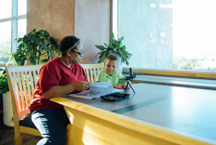 The Science Commons Library celebrates our 4th year in partnership with the Atlanta Science Festival (ASF). This year, we teamed up with the ASF and SciStarter to introduce folks to science activities they can do at home or online. Whether you have a science background or not, you can get involved in the sciences by becoming a citizen scientist. Check out projects you and your family can join today online.
The Science Commons Library celebrates our 4th year in partnership with the Atlanta Science Festival (ASF). This year, we teamed up with the ASF and SciStarter to introduce folks to science activities they can do at home or online. Whether you have a science background or not, you can get involved in the sciences by becoming a citizen scientist. Check out projects you and your family can join today online.
About Citizen Science
 As a citizen scientist you can pick your topic (astronomy, medicine, butterflies, birds, drinking water, gardening soil, etc.), pick your location (in-person or online), and select your skill sets (some background knowledge or none). A citizen scientist is a term first coined in the 1970s, according to the Oxford English Dictionary, and it means “a member of the general public who engages in scientific work, often in collaboration with or under the direction of professional scientists and scientific institutions.” Michael Nielson in his 2012 book, Reinventing Discovery, recognized the value of citizen scientists for both collecting and analyzing enormous data sets. The United States government says citizen scientists “help the federal agencies accelerate innovation through public participation” and has dedicated a Citizen Science web site for both scientists and volunteers.
As a citizen scientist you can pick your topic (astronomy, medicine, butterflies, birds, drinking water, gardening soil, etc.), pick your location (in-person or online), and select your skill sets (some background knowledge or none). A citizen scientist is a term first coined in the 1970s, according to the Oxford English Dictionary, and it means “a member of the general public who engages in scientific work, often in collaboration with or under the direction of professional scientists and scientific institutions.” Michael Nielson in his 2012 book, Reinventing Discovery, recognized the value of citizen scientists for both collecting and analyzing enormous data sets. The United States government says citizen scientists “help the federal agencies accelerate innovation through public participation” and has dedicated a Citizen Science web site for both scientists and volunteers.
For Scientists
If you’re interested in starting a citizen science project in your lab explore these web sites or browse Emory Libraries book collection related to incorporating citizen participation in your research:
- Crowdsourcing & Citizen Science Toolkit – U.S. federal government’s step by step guide for scientists starting a project.
- Zooniverse – A source of advice and an online platform for scientists seeking to start a citizen science project and a directory of online citizen science projects for volunteers. Zooniverse is recognized as one of the leaders in citizen science projects and they state crowdsourcing can produce publishable results.
- Citizen Science Association – Includes training materials for researchers and an open access, peer-reviewed journal
Citizen Science at Emory & Atlanta
 Studying water pollution, butterflies, and plant identification are options for volunteers.
Studying water pollution, butterflies, and plant identification are options for volunteers.
- Emory Campus Biota The community of plants, animals, and fungi on Emory’s campus is always changing. Download the iNaturalist app and upload pictures of plants and animals you see on Emory’s campus. Help develop a biota database to document how this community changes with seasons and across years! iNaturalist identifies organisms which are later verified by experts. Contribute to documenting species even if you’re not sure of their identity. Contact Carolyn Keogh if you have questions. If you are not in Atlanta currently, you can still participate in identification and tagging species near you.
- Neighborhood Water Watch (NWW) is a fast-paced community driven collaborative program between Chattahoochee River Keeper and neighborhood groups, schools and citizens in our watershed. The goal is to work together to assess and improve water quality in urban streams, while protecting human health in neighboring communities. Also, check the CRK site for additional volunteer opportunities or find a Riverkeeper near you.
- Monarch Butterfly Monitoring The Integrated Monarch Monitoring Program (IMMP) is a national initiative dedicated to monitoring monarch butterfly populations and habitat throughout their breeding range. The Atlanta Botanical Gardens have a team you can join or at the IMMP site you can find other locations to participate.
